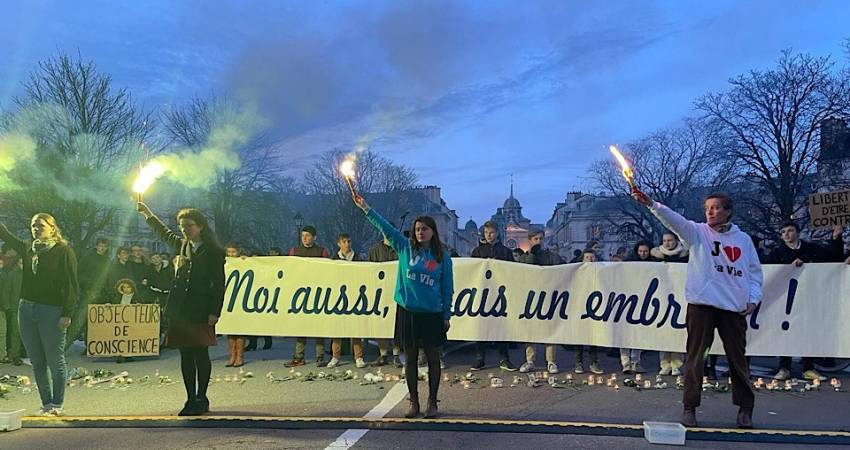
"Abortion is not a freedom": Reaction to France making abortion a constitutional right
France has become the first country to enshrine the right to abortion in its constitution, after MPS voted by 780 votes to 72 to do so. While abortion advocates have hailed the step, pro-life campaigners, the Church, and France’s Former Secretary of State for Culture have spoken out in criticism, with impassioned protests taking place in Versailles on Monday.
The Bill to make abortion a constitutional right was approved on Monday in a joint session of Parliament at the Palace of Versailles. The outcome of the vote prompted a standing ovation in Parliament, however commentators have pointed to the country’s demographic slowdown in light of the decision. The constitution will now be amended to include the “guaranteed right” to abortion, which has been legal in France since 1975.
The country’s law stipulates that a woman can have an abortion until 14 weeks into the pregnancy on request, while abortion is allowed throughout the later stages of pregnancy, including up to birth, if two physicians agree upon certain grounds, including mental and physical health.
France will now become the first country in the world to provide explicit protection for abortion in its basic law. Head of the lower house of Parliament, Yael Braun-Pivet, said on Thursday that she was “proud of this congress, which will say that the right to get an abortion will now be part of our basic law.”
French President Emmanuel Macron, who endorsed the Bill, wrote on X following the vote, “French pride. Universal message.”
He called on the nation to “celebrate together the entry into the constitution of a new liberty” ahead of the enactment of the constitutional change on International Women’s Day, this coming Friday.
Meanwhile, the country’s Prime Minister, Gabriel Attal said: “We’re sending a message to all women: your body belongs to you and no one can decide for you.”
Opposition leader Marine Le Pen, a supporter of constitutional protection for abortion, said that she had “no problem” with the vote.
“We will vote to include it in the constitution because we have no problem with that,” she said. However, she went on to say of the law, “It was an exaggeration to call it an historic step because no one is putting the right to abortion at risk in France.”
Amnesty International was among those to welcome the vote, saying that the “historic” vote was “a source of hope for those who are defending the right to abortion around the world.”
France’s national pro life march, Marche Pour La Vie, maintained a presence in Versailles on Monday, protesting the change. Pro-life supporters wore red as a colour of resistance, along with a black scarf as a colour of mourning – while participants carried a white rose.
“Once again, you have shown France that abortion does not do unanimity,” the organisation said in the statement, telling supporters: “You are the light in the darkness, hope in despair, truth in a lie, but most of all, love in hate. Because in the face of horror, we are the resistance, let’s not give up.”
“More than ever, we affirm our opposition to this act that kills innocent people,” the group, which holds an annual pro-life march in Paris, said.
“Abortion is neither a freedom, a right, nor a success,” they added, while pointing to the 234,300 abortions that took place in the country in 2022. “The task is huge, but so is hope, they added.
“Shame on those who voted to constitutionalize the death of the innocent,” the organisation wrote on X, sharing an ultrasound image of an unborn baby.
Philippe de Villiers, Former Secretary of State for Culture of France, hit out at the constitutional change in a statement which was highly critical of President Macron.
“Macron dares to speak of French pride,” he wrote. “It is infamy. The homicide of innocent people is now part of the Republic’s pediment. French sadness.”
Conservative French journalist and essayist Jean Sévillia was also among those to publicly criticise the vote, sharing an image of an unborn child on X with the words from the perspective of the baby:
“To you who stood up for me today, thank you. Like me, you may have a heavy heart, a feeling of helplessness. But please don’t put out the torch. Don’t give in to hatred either, it destroys. Keep hope and continue to be my voice.”
Criticism of Thursday’s vote has also come from the Church in France. Prior to the vote, the French Catholic Bishops had called for prayer and fasting, telling Catholics: “As Catholics, we will always have to remain servants of the life of each and every one, from conception to death, artisans of respect for every human being which is always a gift given to all others. To support those who choose to keep their child even in difficult situations – and we are looking for new ways to do this – to surround with our respect and compassion those who have had recourse to abortion.”
“Let us humbly and urgently ask for grace. Above all, let us pray that our fellow citizens will rediscover the taste for life; for giving it; for receiving it; for accompanying it; for having and raising children,” the statement read.
« À toi qui a pris ma défense aujourd'hui, merci. Tu as peut-être comme moi le cœur lourd, un sentiment d'impuissance. Mais s'il te plaît, n'éteins pas le flambeau. Ne te laisse pas non plus aller à la haine, elle détruit. Garde l'espérance et continue d'être ma voix. » pic.twitter.com/3kSnaHd6Jw
— Jean Sévillia (@jeansevillia) March 4, 2024
Some commentators have also slammed the decision as “disastrous” in light of the country’s “baby bust.” According to the French government, the birth rate has been in decline for over a decade – including in 2023, when it was down by 7 per cent on the previous year. French newspaper Le Parisien reported in January that the country’s downward demographic trend for more than ten years “has been questioning the evolution of the French family model,” noting that: “The large family disappears, French women have children later and later and… less and less.”
In response to the country’s falling birthrate, President Macron has announced a plan for what he has labelled “demographic rearmament,” which would include fertility testing for men and women aged 25.
According to France’s Minister Delegate for Equality between Women and Men, Aurore Bergé, infertility remains a problem that “we often talk about too late” and which “goes hand in hand with the issue of our public health”.
Maria Maynes
This article first appeared on Gript and is published here with permission
Featured
- Abortion coercion has arrived in Ireland – the NWC are silent
- Review of at-home abortions 'needed after coercion case'
- French Govt to remind 29-year-olds of biological clock
- Huge factor in decline in primary school numbers ignored
- Germany Denies Promoting Abortion Abroad—While Funding Pro-Abortion NGOs
- Govt don’t oppose Coppinger abortion bill at 1st stage
- March for Life: Vance, the White House, and a Divided Pro-Life Movement
- Paris’ Annual March for Life Puts Euthanasia in the Spotlight
- Britain’s seemingly limitless abortion rate
- The importance of the work carried out by Every Life Counts
- Puerto Rico officially recognizes unborn children as ‘natural persons’
- Assisted suicide laws stalled by “complex” legal issues
- Yes, that hideous celebration of 300 abortions is real
- White Crosses Memorial: Dungarvan once again pays its respects to our aborted babies
- Josiah: Abortion Survivor
- Rally for Life 2025


























